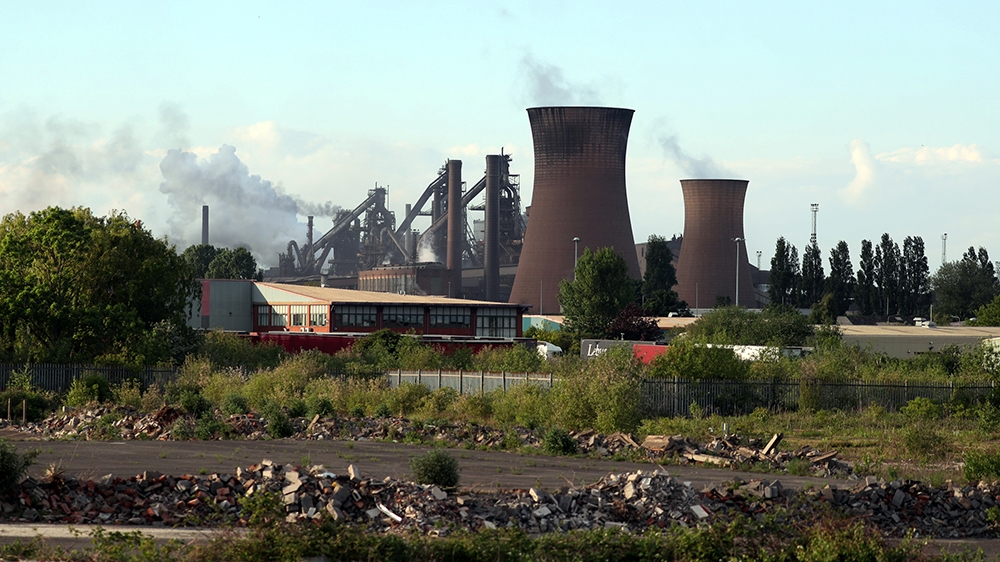British Steel collapse: 25,000 jobs at risk as assets liquidated
British Steel has been ordered into compulsory liquidation after talks with the government failed to secure a bailout, threatening the jobs of about 5,000 employees, with another 20,000 jobs in the supply chain.
The steelmaker had requested an emergency $38m bailout loan from the British government following dwindling European sales amid Brexit uncertainty, and an ill-fated decision to sell off excess carbon credits earlier this year.
Just three weeks ago, the government had given a $150m loan to the company.
“The government can only act within the law, which requires any financial support to a steel company to be on a commercial basis,” Business Secretary Greg Clark said in a statement emailed to Al Jazeera.
“I have been advised that it would be unlawful to provide a guarantee or loan on the terms of any proposals that the company or any other party has made.”
The company’s 5,000 workers are mostly at a giant plant in the northern town of Scunthorpe, and a further 20,000 jobs are dependent upon its supply chain.
“This is devastating, awful news for steelworkers and their families, and for everybody related to the community and the area,” Nic Dakin, MP for Scunthorpe, told the BBC.
“What’s really important is that steps are taken to retain steelmaking in Scunthorpe and the other areas affected because this is crucial to our future as an independent, modern economy, modern nation.
“If it’s necessary for the government to take a public stake in the future of this industry, that’s what the government should do. Let’s take one step at a time,” he said.
Unions had urged the government to hammer out a deal after the beleaguered manufacturer asked the government for a $95m loan last week.
The loan was refused, and the steelmaker’s owners, Greybull Capital, agreed to put up some of the money themselves, reducing the loan request to $38m.
“This will be a deeply worrying time for the thousands of dedicated British Steel workers, those in the supply chain and local communities,” said Clark.
“In the days and weeks ahead, I will be working with the Official Receiver and a British Steel support group of management, trade unions, companies in the supply chain and local communities, to pursue remorselessly every possible step to secure the future of the valuable operations in sites at Scunthorpe, Skinningrove and on Teesside.”
New British warships should be built from British-sourced steel to provide a lifeline for the embattled industry, an MP urged.
The Royal Navy is due to build a new fleet of support vessels, but the Ministry of Defence has so far “refused to confirm” if it will buy UK-produced steel for the ships, Labour MP Nick Smith told the House of Commons on Wednesday.
Brexit blamed
British Steel, whose assets now face compulsory liquidation, has blamed Brexit uncertainty for a thinning order book.
Three weeks ago, the government agreed to provide a $150m loan so that the company could make its payments to a European Union environmental scheme and avoid a $630m fine from European regulators.
Under the scheme, companies are awarded a certain number of “carbon credits” based on their target emissions outputs.
If they perform well and emit less carbon, as British Steel did from 2013 to 2018, they can sell their remaining credits to those companies emitting more carbon into the atmosphere. British Steel sold off its remaining credits when Britain was expecting to leave the EU at the end of March.
Then Brexit was delayed by six months and the manufacturer faced a huge shortfall in its credits, facing a huge fine.
On Tuesday, pro-Brexit politicians in the House of Commons urged their colleagues to pass Theresa May’s EU Withdrawal Agreement when it returns to parliament in order to give some certainty to businesses.
The steelmaker told The Guardian last week that its EU orders had dried up. In the event of a “no-deal” Brexit, WTO tariffs on steel would be 20 percent – a significant disincentive for European buyers.
About 70 percent of British Steel’s products are exported to either the EU or Turkey and North Africa, according to the Financial Times.
But British Steel’s problems go back further still. Formerly part of Tata Steel’s European operations, a deal to sell off the division fell apart in 2015, with would-be buyers citing China’s dumping of steel onto global markets causing unpredictable price fluctuations as a major reason for abandoning the purchase.
In 2016, Greybull Capital, a private investment firm, bought Tata’s steel division for a token amount of £1 ($1.27 at the current rate) – and renamed it British Steel, saving thousands of jobs.
Now, Greybull itself is facing additional scrutiny. In the two years following the acquisition, Greybull charged British Steel more than $20m a year in interest on loans it had itself provided, the Financial Times reported.
The newly owned British Steel also made a $50m investment in a French steelmaker.





